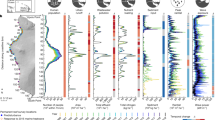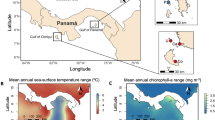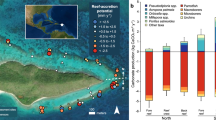Abstract
Even if carbon emissions are reduced drastically in the next decade the amount of carbon already stored in the atmosphere would lead to the occurrence of extreme thermal events every three to four years between 2040 and 20801,2. This time lag on the effect of reducing emissions suggests that the benefits of carbon emission reduction on the health of coral reefs will be noticeable only in the long term2,3,4. Here, we use a spatially explicit ecosystem model to compare the potential ecosystem benefits that Caribbean and Pacific reefs could gain from reductions in carbon emissions, and the timescale of these benefits. We found that whereas the effect of a reduction in emissions on Caribbean reefs will be modest and realized only in the long term (more than 60 years), Pacific reefs would start to show benefits within the first half of this century. Moreover, it seems that Pacific reefs have the potential to maintain their ecological integrity and ecosystem state in the mid- to long term if carbon emissions are reduced, but only if plate-like corals are present.
This is a preview of subscription content, access via your institution
Access options
Subscribe to this journal
Receive 12 print issues and online access
$209.00 per year
only $17.42 per issue
Buy this article
- Purchase on Springer Link
- Instant access to full article PDF
Prices may be subject to local taxes which are calculated during checkout




Similar content being viewed by others
References
Hoegh-Guldberg, O. et al. Coral reefs under rapid climate change and ocean acidification. Science 318, 1737–1742 (2007).
Donner, S. D., Skirving, W. J., Little, C. M., Oppenheimer, M. & Hoegh-Guldberg, O. Global assessment of coral bleaching and required rates of adaptation under climate change. Glob. Change Biol. 11, 2251–2265 (2005).
Edwards, H. J. et al. How much time can herbivore protection buy for coral reefs under realistic regimes of hurricanes and coral bleaching? Glob. Change Biol. 17, 2033–2048 (2011).
Ortiz, J., González-Rivero, M. & Mumby, P. An ecosystem-level perspective on the host and symbiont traits needed to mitigate climate change impacts on Caribbean coral reefs. Ecosystems 17, 1–13 (2013).
Frieler, K. et al. Limiting global warming to 2 °C is unlikely to save most coral reefs. Nature Clim. Change 3, 165–170 (2012).
Matthews, H. D. & Caldeira, K. Stabilizing climate requires near-zero emissions. Geophys. Res. Lett. 35, L04705 (2008).
Bozec, Y-M. & Mumby, P. J. Synergistic impacts of global warming on the resilience of coral reefs. Phil. Trans. R. Soc. B (in the press).
Graham, N. A. J., Cinner, J. E., Norström, A. V. & Nyström, M. Coral reefs as novel ecosystems: Embracing new futures. Curr. Opin. Environ. Sustain. 7, 9–14 (2014).
Kreyling, J., Jentsch, A. & Beier, C. Beyond realism in climate change experiments: Gradient approaches identify thresholds and tipping points. Ecol. Lett. 17, 125–e1 (2014).
Fung, T., Seymour, R. M. & Johnson, C. R. Warning signals of regime shifts as intrinsic properties of endogenous dynamics. Am. Nat. 182, 208–222 (2013).
Anthony, K. R. N. et al. Ocean acidification and warming will lower coral reef resilience. Glob. Change Biol. 17, 1798–1808 (2011).
Kubicek, A., Muhando, C. & Reuter, H. Simulations of long-term community dynamics in coral reefs — how perturbations shape trajectories. PLoS Comput. Biol. 8, e1002791 (2012).
Ortiz, J. C., González-Rivero, M. & Mumby, P. J. Can a thermally tolerant symbiont improve the future of Caribbean coral reefs? Glob. Change Biol. 19, 273–281 (2013).
Roff, G. & Mumby, P. J. Global disparity in the resilience of coral reefs. Trends Ecol. Evol. 27, 404–413 (2012).
Mendelsohn, R., Emanuel, K., Chonabayashi, S. & Bakkensen, L. The impact of climate change on global tropical cyclone damage. Nature Clim. Change 2, 205–209 (2012).
Mumby, P. J. & vanWoesik, R. Consequences of ecological, evolutionary and biogeochemical uncertainty for coral reef responses to climatic stress. Curr. Biol. 24, R413–R423 (2014).
Kennedy, E. V. et al. Avoiding coral reef functional collapse requires local and global action. Curr. Biol. 23, 912–918 (2013).
Ban, S. S., Graham, N. A. & Connolly, S. R. Evidence for multiple stressor interactions and effects on coral reefs. Glob. Change Biol. 20, 681–697 (2014).
Mumby, P. J. The impact of exploiting grazers (scaridae) on the dynamics of Caribbean coral reefs. Ecol. Appl. 16, 747–769 (2006).
Bozec, Y. M., Yakob, L., Bejarano, S. & Mumby, P. J. Reciprocal facilitation and non-linearity maintain habitat engineering on coral reefs. Oikos 122, 428–440 (2013).
Halford, A., Cheal, A., Ryan, D. & Williams, D. M. Resilience to large-scale disturbance in coral and fish assemblages on the Great Barrier Reef. Ecology 85, 1892–1905 (2004).
Linares, C., Pratchett, M. & Coker, D. Recolonisation of Acropora hyacinthus following climate-induced coral bleaching on the Great Barrier Reef. Mar. Ecol. Prog. Ser. 438, 97–104 (2011).
Connolly, S. R. & Muko, S. Space preemption, size-dependent competition, and the coexistence of clonal growth forms. Ecology 84, 2979–2988 (2003).
Wallace, C. C. Reproduction, recruitment and fragmentation in 9 sympatric species of the coral genus Acropora. Mar. Biol. 88, 217–233 (1985).
Ortiz, J. C., Gomez-Cabrera, M. D. & Hoegh-Guldberg, O. Effect of colony size and surrounding substrate on corals experiencing a mild bleaching event on Heron Island reef flat (southern Great Barrier Reef, Australia). Coral Reefs 28, 999–1003 (2009).
Van Woesik, R., Sakai, K., Ganase, A. & Loya, Y. Revisiting the winners and the losers a decade after coral bleaching. Mar. Ecol. Prog. Ser. 434, 67–76 (2011).
Roff, G. et al. The ecology of ‘acroporid white syndrome’, a coral disease from the southern Great Barrier Reef. PLoS ONE 6, e26829 (2011).
Bythell, J. & Sheppard, C. Mass mortality of Caribbean shallow corals. Mar. Pollut. Bull. 26, 296–297 (1993).
Mumby, P. J. et al. Coral reef habitats as surrogates of species, ecological functions, and ecosystem services. Conserv. Biol. 22, 941–951 (2008).
Aronson, R. B. & Precht, W. F. White-band disease and the changing face of Caribbean coral reefs. Hydrobiologia 460, 25–38 (2001).
Acknowledgements
This study was supported by an Australian Research Council Laureate Fellowship and a National Environmental Research Program grant to P.J.M. that also supported N.H.W. GBR coral trajectory data provided by the Long-Term Monitoring Program of the Australian Institute for Marine Science.
Author information
Authors and Affiliations
Contributions
J.C.O. designed the study, analysed the data and wrote the manuscript; Y-M.B. assisted in writing the model code, assisted in analysing the data and edited the manuscript; N.H.W. processed the empirical data for the validation, processed the GBR climate change scenarios data and assisted in writing the manuscript; C.D. provided empirical data for the parameterization of the Pacific model and edited the manuscript; P.J.M. conceived and helped design the study and co-authored the manuscript.
Corresponding author
Ethics declarations
Competing interests
The authors declare no competing financial interests.
Supplementary information
Rights and permissions
About this article
Cite this article
Ortiz, J., Bozec, YM., Wolff, N. et al. Global disparity in the ecological benefits of reducing carbon emissions for coral reefs. Nature Clim Change 4, 1090–1094 (2014). https://doi.org/10.1038/nclimate2439
Received:
Accepted:
Published:
Issue Date:
DOI: https://doi.org/10.1038/nclimate2439
This article is cited by
-
Did innovative city constructions reduce carbon emissions? A quasi-natural experiment in China
Environment, Development and Sustainability (2023)
-
Variance of coral anti-pathogen defense in response to transplantation between coral- and macroalgal-dominated reefs
Coral Reefs (2022)
-
Fine-scale time series surveys reveal new insights into spatio-temporal trends in coral cover (2002–2018), of a coral reef on the Southern Great Barrier Reef
Coral Reefs (2021)
-
Embracing a world of subtlety and nuance on coral reefs
Coral Reefs (2017)
-
A robust operational model for predicting where tropical cyclone waves damage coral reefs
Scientific Reports (2016)



